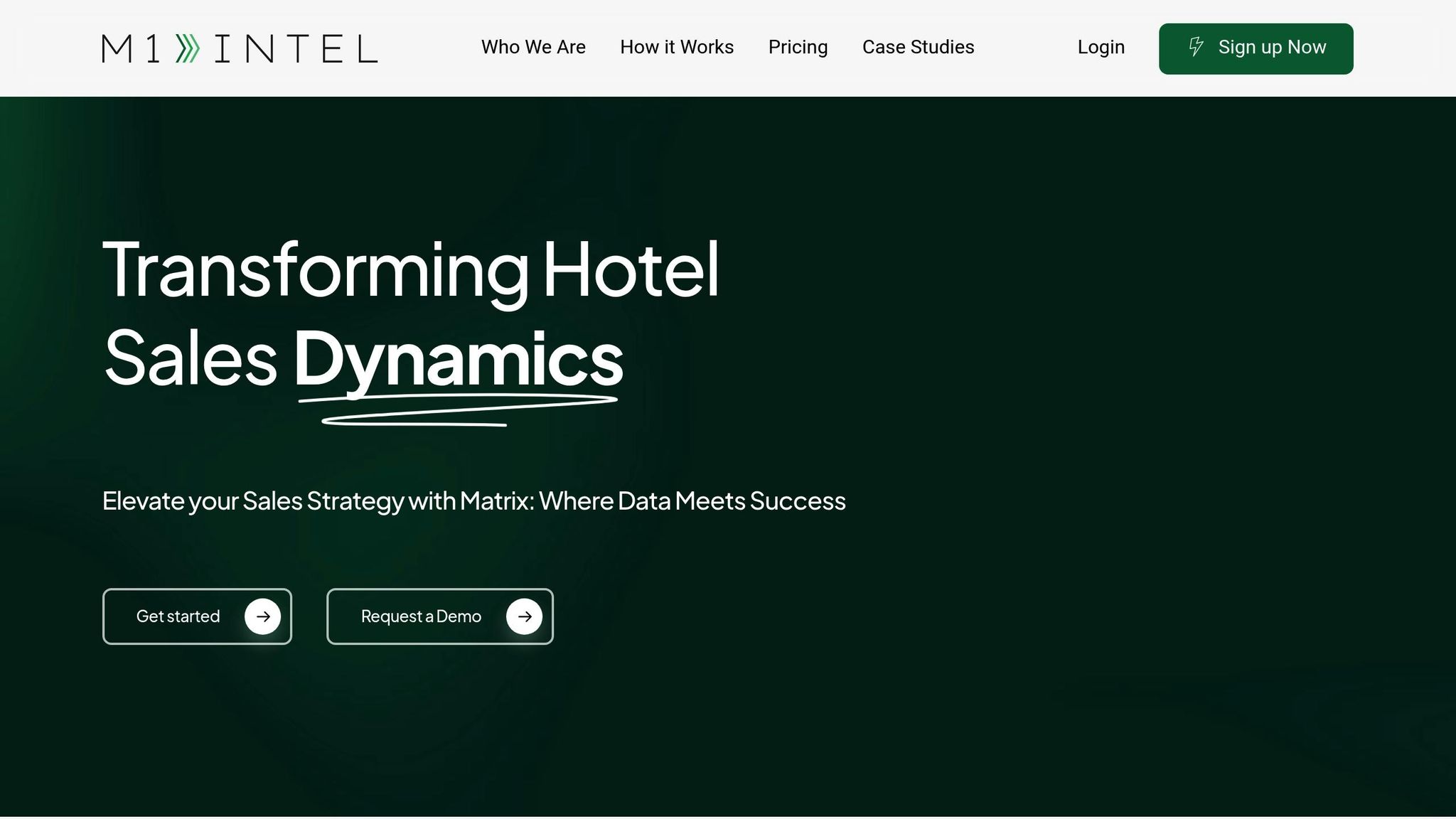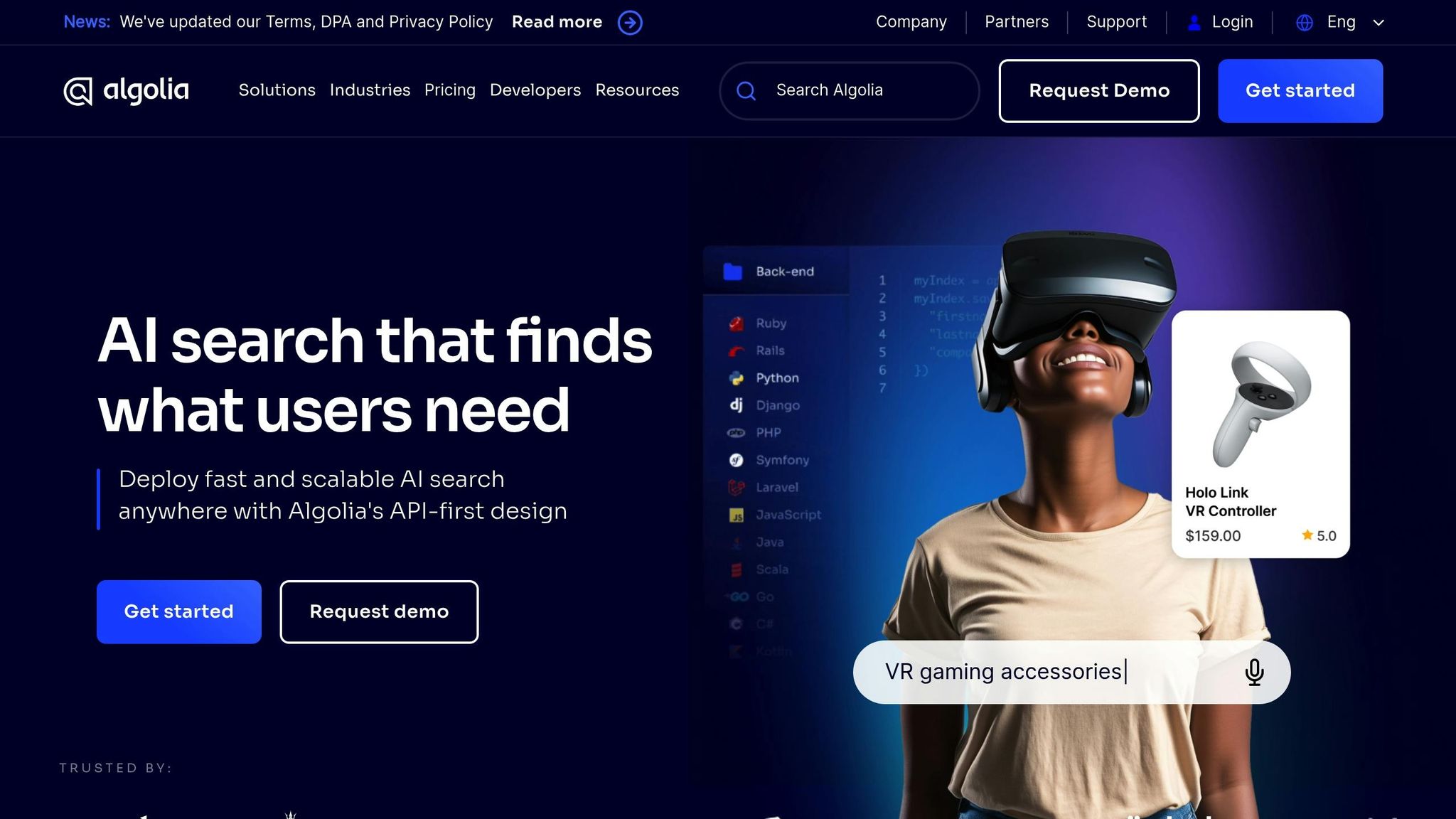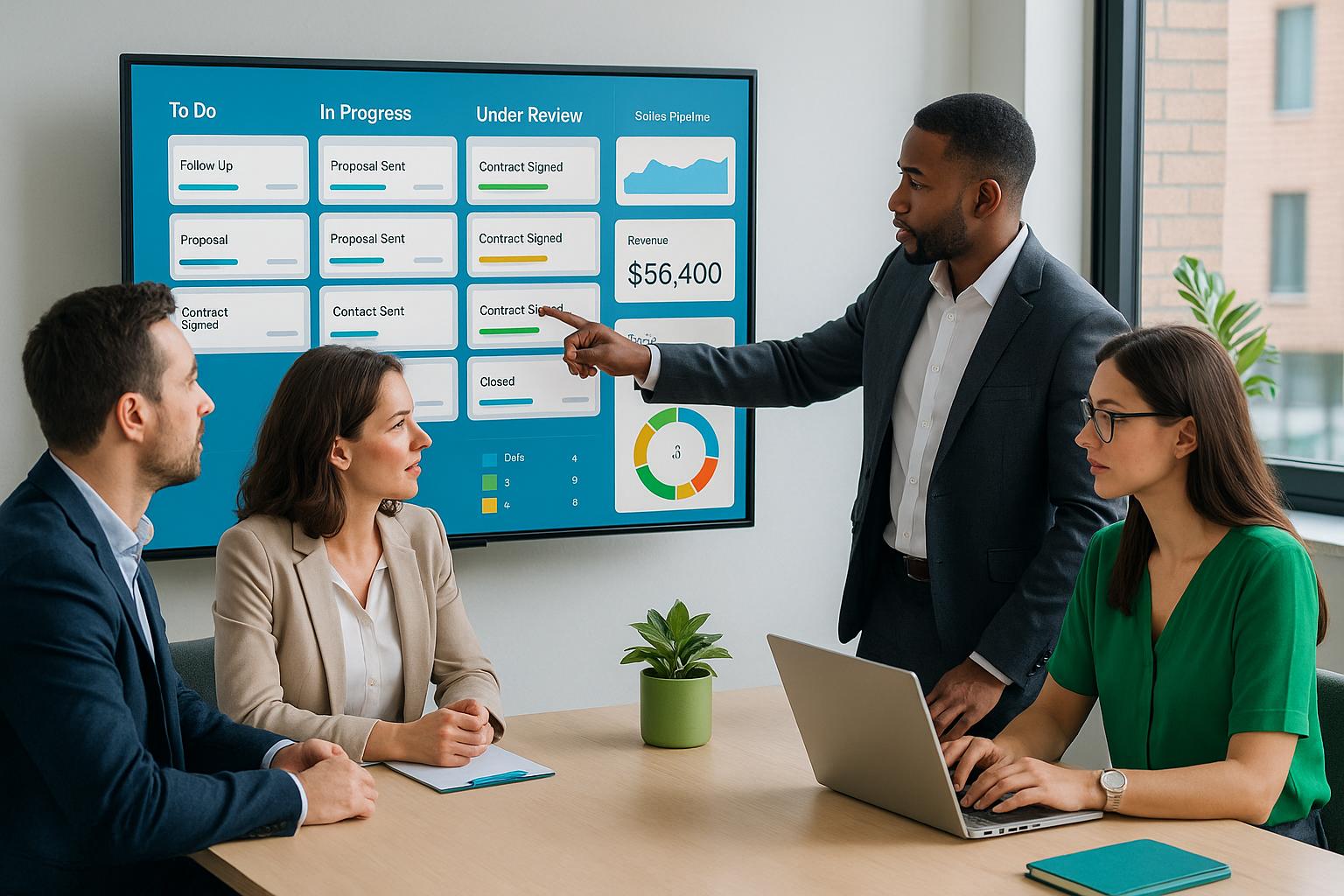Managing sales for multiple hotel properties is challenging, especially with outdated systems slowing down response times and creating inefficiencies. Hotels often face issues like fragmented data, manual processes, and lack of centralized tools, which lead to missed opportunities and poor sales performance. Here’s how modern sales pipeline tools can help:
- Centralized Data: Consolidates leads, bookings, and sales details into one platform for better visibility and management.
- Automation: Eliminates repetitive tasks like follow-ups and data entry, allowing teams to focus on closing deals.
- Real-Time Insights: Provides instant access to sales performance metrics, helping managers make faster, informed decisions.
- Improved Collaboration: Enables team members to share information and work together seamlessly across properties.
- Kanban-Style Workflows: Visual tools help track deals, prioritize leads, and identify bottlenecks in the sales process.
Matrix by M1 Intel is a hospitality-specific solution designed to address these challenges. It simplifies lead management, offers brand-agnostic functionality, and provides analytics tailored to hotel operations. With features like automated follow-ups, real-time search, and role-based access, tools like Matrix streamline operations, improve efficiency, and help hotel groups boost revenue across their portfolios.
How To Maximize Your Hotel Sales Pipeline
Core Features of Multi-Property Sales Pipeline Tools
A well-designed sales pipeline tool can redefine how hotel groups manage operations across multiple properties. Hospitality-specific platforms must address the unique challenges of the industry, ensuring seamless coordination and effective management. Below are the key features that make the most impact.
Centralized Lead and Opportunity Management
Bringing all leads into a single, unified system is the backbone of effective multi-property sales management. Instead of juggling multiple spreadsheets and systems, consolidating data into one platform ensures every lead, booking detail, and guest preference is stored in one place. This approach not only prevents double-booking but also helps sales teams quickly check property availability, identify cross-selling opportunities, and streamline communication. Research shows that CEOs who focus on sales pipeline management can outperform their peers in revenue and profitability by up to 80%. With every step of the sales journey – from inquiry to confirmation – tracked in one system, it’s easier to identify what’s working and where adjustments are needed. Plus, a centralized platform offers clear, visual tracking of deals, providing teams with a comprehensive view of their pipeline.
Visual Workflow Management with Kanban-Style Interfaces
Kanban-style interfaces revolutionize how sales teams manage their pipelines. These visual tools map out the sales process, showing deals as they move through stages like initial contact, negotiation, and contract signing. This setup allows teams to see at a glance where each opportunity stands and what needs attention next. By limiting the number of deals in each stage, Kanban boards encourage better prioritization, helping teams focus on what matters most. For multi-property operations, these workflows are invaluable – sales managers can quickly spot bottlenecks across properties, reallocate resources as needed, and maintain consistent processes. On top of that, reducing time spent on manual tasks means teams can focus more on engaging with prospects rather than hunting for information.
Team Collaboration and Multi-User Access
Managing sales across multiple properties requires seamless collaboration between team members, departments, and locations. Multi-user access ensures everyone has real-time information at their fingertips, fostering better communication. Studies reveal that teams with high levels of trust are 5.1 times more likely to deliver results, while efficient communication can boost effectiveness by 2.8 times. Role-based access adds another layer of efficiency – sales managers can view pipeline analytics, while individual representatives focus on their assigned accounts. Additionally, when other departments like catering or event planning can access booking details, they’re better equipped to deliver exceptional guest experiences. This level of coordination ensures a smoother sales journey for clients and guests alike.
Built-in Analytics and Reporting
Data is the driving force behind successful hotel sales strategies. Built-in analytics provide insight into conversion rates, sales cycle durations, and revenue trends across an entire property portfolio. By offering portfolio-level reporting, these tools enable sales managers to spot patterns that might otherwise go unnoticed. For instance, comparing performance across properties can highlight seasonal trends or uncover areas for improvement. Real-time metrics also allow teams to generate reports on pipeline health, conversion rates, and revenue forecasts without waiting for monthly or quarterly reviews. With targeted emails accounting for 58% of digital revenue, these insights empower teams to make informed, timely decisions that drive growth.
Automated Sales Tasks
Automation eliminates repetitive tasks, freeing up sales teams to focus on what they do best – building relationships and closing deals. Automated follow-ups ensure leads don’t go cold, while workflows for rate loads and proposals streamline the sales process. In the fast-paced world of hotel sales, automation can handle tasks like scheduling personalized communications based on lead behavior, sending deadline reminders, and triggering alerts for urgent actions. Lead scoring automation further helps prioritize opportunities, directing energy to the most promising prospects. By automating administrative tasks like data entry, proposal generation, and contract management, teams can reduce errors and speed up deal closures. These automated tools, tailored for hotel operations, deliver efficiency and precision across multi-property sales efforts.
These features form the foundation for hotel-specific tools designed to optimize sales processes, ensuring smoother operations and better results across multiple properties.
Matrix by M1 Intel: A Hotel-Specific Solution

Matrix is a sales automation and CRM platform created specifically for hotel sales teams. Designed by hotel owners and operators, it addresses the unique challenges of managing sales across multiple properties. By tackling issues like fragmented data and manual processes, Matrix provides a solution tailored to the hospitality industry.
The platform focuses on the key areas that drive hotel revenue: RFPs, Local Negotiated Rates (LNRs), and group business. This specialized approach allows sales teams to spend less time wrestling with generic tools and more time on activities that generate results. Let’s explore how Matrix supports these efforts through its core features.
Simplified Lead Management and Opportunity Tracking
Matrix brings all sales data into one cloud-based system, giving teams a complete view of leads and ensuring no opportunities slip through the cracks. By eliminating data silos, it creates a seamless workflow for capturing and managing leads.
The platform is scalable, whether you’re operating a single boutique hotel or managing an extensive portfolio. It centralizes leads from various sources, making it easy for teams to qualify and track them, all while reducing the need for manual data entry.
Kanban-Style Interface and Brand-Agnostic Functionality
Matrix features a real-time Kanban interface that simplifies pipeline management across properties. With its drag-and-drop functionality, sales teams can easily track opportunities and monitor the health of their pipelines. Its brand-agnostic design makes it ideal for management companies overseeing multiple hotel brands, ensuring consistent sales performance tracking without the hassle of juggling multiple systems. The intuitive interface also means teams can quickly get up to speed and focus on closing deals that matter.
Lightning-Fast Data Access with Algolia Search

Matrix incorporates Algolia Search, delivering instant results with features like typo tolerance, synonym recognition, and business-specific filtering. For hotel sales teams managing large volumes of accounts and opportunities, this functionality saves time and boosts productivity. Additional tools like autocomplete and faceted search make it easy to access client details, booking history, and communication records, enabling more tailored interactions.
Collaboration and Secure Data Management
Matrix promotes teamwork with role-based permissions, ensuring every team member has the right level of access. This setup supports secure data sharing and smooth transitions between departments. Hotels maintain full ownership of their sales data, protecting sensitive client information and retaining valuable business insights for strategic planning.
Tailored for U.S. Business Standards
Matrix is fully aligned with U.S. business practices, using dollar-based reporting (e.g., $1,234.56), MM/DD/YYYY date formats, Fahrenheit for temperature, and imperial units for measurements. Its number formatting – commas for thousands and periods for decimals – ensures compatibility with standard American accounting systems and business tools. This alignment makes it easy for hotels to integrate Matrix into their existing workflows and reporting processes.
sbb-itb-a5d89e3
Benefits of Multi-Property Sales Pipeline Management
Managing sales pipelines across multiple properties can feel like juggling too many balls at once. But with the right tools, hotels can simplify operations, gain better insights, and drive revenue growth. Multi-property sales pipeline platforms are designed to tackle the complexities of managing multiple properties while opening doors to new opportunities for collaboration and efficiency.
Streamlined Operations Across Properties
A centralized platform can cut down on repetitive tasks, slashing administrative work and IT expenses. Automation takes over time-consuming processes like transferring inquiries and updating reservations, freeing sales staff to concentrate on activities that directly impact revenue. According to an Accenture study, companies in the travel and hospitality industry are 74% more likely to boost profitability with AI-powered automation tools.
The efficiency gains are undeniable. Hotels using sales and catering software report over a 50% group booking conversion rate and shave off an average of 35 minutes per transaction. Imagine the cumulative impact of these time savings across multiple properties – it’s a game-changer.
Automation doesn’t just speed things up; it also connects departments more effectively. With cloud-based management systems, costs are reduced, and collaboration improves, making it easier to market a brand and streamline internal workflows.
Enhanced Visibility and Control
Once operations run more smoothly, the next step is gaining a clear view of what’s happening across the board. Multi-property sales pipeline tools provide detailed insights into sales performance, offering real-time access to group-wide and property-specific reports. These include forecasts, revenue summaries, and flash reports – essential for understanding both financial and operational health.
This level of visibility allows sales managers to make informed decisions quickly. As Christian Lundgren, Sales Manager at The Winery Hotel, puts it:
“Demand Calendar helps me keep track of our agreements without losing time in administration. Before Demand Calendar, it was difficult to find all the data components I needed in our PMS, but now it’s just 1 click away. This makes it much easier to see patterns and react to them before it’s too late.”
With this kind of control, teams can work more cohesively and respond to challenges before they escalate.
Smoother Team Collaboration
Collaboration is the backbone of any successful operation, and multi-property sales tools make it seamless. These platforms act as a shared workspace, where teams can access and update information in real time. Sales teams can share leads, assign tasks, and communicate internally, ensuring that customer interactions are consistent across properties.
But it’s not just about individual teams. The benefits extend across entire hotel groups, enabling coordination between departments to deliver a smoother, more unified customer experience.
Smarter Planning with Data-Driven Insights
Data is the secret weapon for hotels looking to optimize their sales pipelines. Companies that excel in pipeline management report 28% higher revenue growth compared to those that don’t. In fact, data-driven organizations are 23 times more likely to win new customers and are 20 times more profitable overall.
Analytics tools can fine-tune pricing strategies by factoring in demand, competitor rates, and market trends. By diving into customer feedback and booking patterns, hotels can identify areas for improvement – whether it’s product quality or service gaps – and address them proactively. This is crucial, especially considering that 71% of customers feel frustrated by impersonal experiences, and 63% stop engaging with brands that fail at personalization.
Predictive analytics adds another layer of value, helping hotels anticipate market shifts and adjust their strategies accordingly. Sales teams can prioritize leads based on engagement and intent signals, improving their chances of closing deals faster. Accurate forecasting, backed by historical data and mathematical models, helps allocate resources wisely, set realistic goals, and mitigate risks. These insights also guide decisions on budgeting, staffing, and pricing, ensuring that every move is backed by solid data.
Conclusion: Improving Hotel Sales with Multi-Property Pipeline Tools
The hospitality industry is rapidly evolving, and hotels managing multiple properties face challenges that traditional sales tools just can’t handle. That’s where specialized multi-property sales pipeline tools come into play – they’re no longer optional but essential for staying competitive.
The numbers tell the story. The property management system market is expected to hit $52.21 billion by 2032. Real-world examples highlight how these tools are reshaping the industry. Take Zero Hotels, a Portuguese lodging chain, as an example: they boosted bookings by 25% across platforms and slashed new staff training time by half. Similarly, AMR Collection, which oversees more than 50 hotels and luxury resorts, achieved an impressive 80–90% guest engagement across their properties.
One hotel group demonstrated just how agile these tools can make operations by integrating a new property into their system in only three days. This kind of speed allows businesses to scale faster and adapt to market shifts more effectively.
Matrix, a tool built specifically for the unique demands of multi-property hotel management, exemplifies these benefits. With features like brand-agnostic tools, Kanban-style workflows, and built-in search capabilities, Matrix simplifies operations and enhances team collaboration. As guest expectations continue to rise, tools like these are critical for maintaining efficiency and staying ahead of the curve.
For hotel operators managing multiple properties, the question isn’t if they should invest in specialized pipeline tools – it’s when. Early adopters will gain a significant edge, setting new industry standards by integrating faster and responding to market opportunities with unmatched agility.
FAQs
How can multi-property sales pipeline tools enhance teamwork among hotel sales teams?
Multi-property sales pipeline tools make teamwork easier by offering a central hub where sales teams can work together seamlessly on leads and opportunities across multiple hotel locations. These platforms simplify communication, give everyone a clear view of shared tasks, and help team members coordinate their efforts instantly.
With features like shared account and opportunity access, user-friendly interfaces, and progress tracking tools, these systems boost collaboration and efficiency, keeping the entire team focused on shared sales goals and priorities.
What challenges do multi-property sales pipeline tools help solve in the hotel industry?
Managing multiple hotel properties comes with its fair share of challenges, and that’s where multi-property sales pipeline tools step in. These tools are specifically designed to solve issues like fragmented systems, which often lead to inconsistent workflows and a drop in efficiency, as well as limited pipeline visibility, making it tough to monitor leads and opportunities across various locations.
They also tackle problems such as pipeline imbalance, where some properties may lag behind others, lead leakage, and the complexity of managing availability across a portfolio. By bringing these processes under one roof, these tools make it easier to collaborate, boost efficiency, and enhance sales performance across multiple properties.
How does automation in sales pipeline tools improve the efficiency of hotel sales teams?
Automation in sales pipeline tools transforms how hotel sales teams operate by cutting down on time-consuming manual tasks and simplifying workflows. These tools handle lead management, track opportunities, and take care of repetitive tasks like follow-ups and proposal submissions, freeing up hours that would otherwise be spent on administrative work.
By letting automation handle the busywork, sales teams can dedicate their energy to what truly matters – building strong client relationships and closing deals. The result? Boosted productivity, quicker response times, and increased revenue across hotel portfolios.
